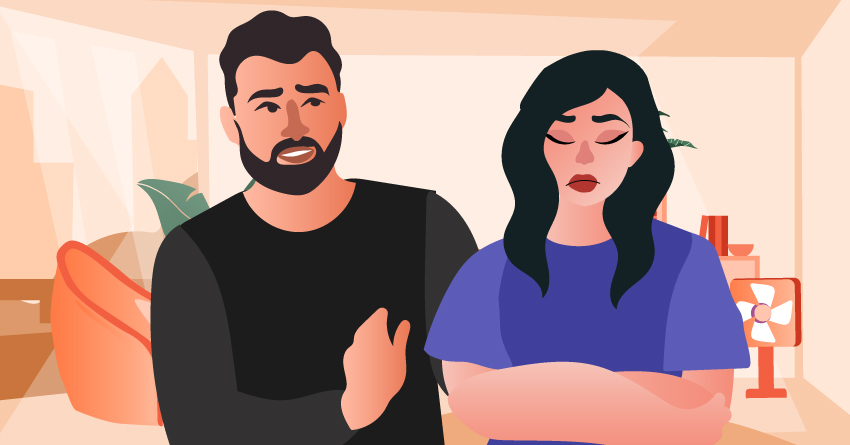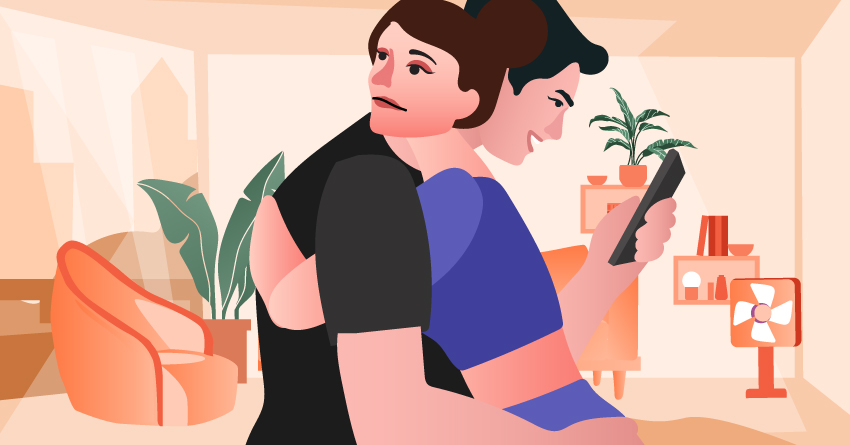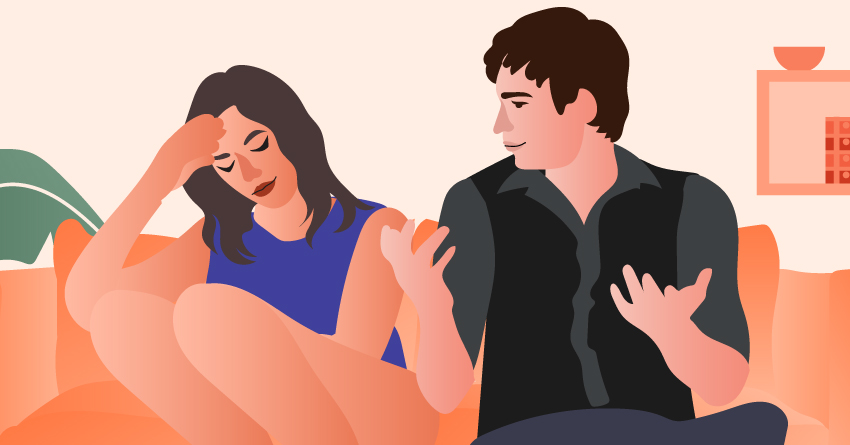
Nonchalant is used to casually describe someone as calm, collected, and unfazed by any situation—a trait often linked to confidence. After all, staying cool and taking things in stride is a sign of self-assurance. However, these days, it’s often associated with a different meaning.
In this brief guide, we’ll discuss what “nonchalant” means in relationships and how to deal with a “nonchalant partner.”
What is a Nonchalant Partner?

As defined by Merriam-Webster, nonchalant means “having an air of easy unconcern or indifference.”
When it’s used to describe a partner, it often refers to someone who seems emotionally unavailable— someone who isn’t putting enough effort into the relationship and distancing themselves from deeper emotional connections.
Signs of a Nonchalant Partner
Do you feel like your partner is showing nonchalant tendencies in your relationship? Or maybe it’s the other way around—your partner thinks you are the nonchalant one. Here are some signs to look out for:
1Lack of Affection

A common sign of a nonchalant partner is their lack of affection. At first, they might have said some romantic lines and compliments to impress you, but as time goes on, they may stop expressing how much they love you or fail to share compliments altogether. They might only say “I love you” when prompted, but they rarely hold your hand or show any of the affection typically seen in healthy couples.
Of course, people express affection in different ways. Your partner might not like holding hands in public and may see it as inconvenient. They could have grown up in a household where “gift giving” or “acts of service” were the primary love languages. However, if you’ve already communicated your desires and how you’d like to be loved, and they still refuse to compromise, they’re clearly leaning into that “nonchalant” territory.
-
₱6,745.00
-
₱3,395.00
-
₱1,995.00
-
₱950.00
2Lack of Empathy and Vulnerability

When you’re in a relationship with a nonchalant partner, it can feel like you’re the only one actively expressing emotions. Your partner rarely shows any enthusiasm. No matter how important the topic is or how excited you are about something, their response might be lackluster.
When you’re dealing with issues and feeling more emotional than usual, your partner might seem completely oblivious to your need for comfort. You might get an awkward hug, and that’s about it.
During fights, you may feel fully vulnerable and pour out your emotions while your partner remains largely unresponsive or resorts to stonewalling. They may also invalidate your feelings, seeing the issue as a minor thing that doesn’t need further discussion.
-
₱995.00
-
₱1,019.00
-
₱2,695.00
3Lack of Effort and Involvement

Another clear sign that someone may not care much in the relationship is their lack of effort towards their significant other. They don’t plan dates, often choose to be on their phones while spending time together, forget to bring gifts, acknowledge important events, and show any interest in their partner’s interest and overall life.
For instance, if their partner is excited about attending a certain event and wants them to be there, they might decline to join simply because they’re not personally interested, even if it’s significant to their partner. It’s as if they only want to participate when there’s something in it for them, opting for the bare minimum in terms of effort.
Causes
If you’ve noticed that you or your partner is becoming nonchalant, it doesn’t necessarily mean the relationship is doomed or that you need to break up right away. As long as your partner is aware of their behavior and makes an effort to change, there’s still hope.
Here are some possible reasons they might be emotionally distant. Please note that this isn’t an exhaustive list, and other factors may be at play.
1They may have an avoidant attachment style.

The concept of attachment styles was developed by psychoanalyst John Bowlby and later expanded upon by developmental psychologist Mary Ainsworth. According to attachment theory, a person’s early relationships, particularly with their caregivers, can significantly impact their romantic relationships later in life.
Individuals with an avoidant attachment style likely grew up with emotionally distant parents, such as working parents who were preoccupied with their careers and other responsibilities. These caregivers may have dismissed or overlooked their accomplishments, leading the child to internalize the belief that no one truly cares for them. As a result, they’ve learned to rely on themselves and work through their emotions independently.
As they grow up, that belief remains ingrained in their minds, leading them to become overly independent in their relationships. They may show less affection and vulnerability to their partners, not because they don’t love them, but because it’s how they’ve learned to navigate emotional connections. That’s what they’re used to.
2They hide behind nonchalance rather than communicating openly.

Some nonchalant partners don’t start out that way at all. In the beginning, they might be putting in extra effort—planning lavish dates, showering you with sweet messages, and dedicating quality time just for the two of you.
But then, what changed? How could someone who once seemed to give their all suddenly appear indifferent?
It’s often a gradual shift, but sometimes, it can stem from something you’ve said or done in the past. Perhaps you weren’t as appreciative of their efforts as you could have been, or maybe you found yourself nitpicking their mistakes instead of celebrating their successes. Little comments or criticisms can build up over time, making your partner feel undervalued or discouraged.
Now, this isn’t entirely your fault. Your partner should also take responsibility for communicating their feelings instead of bottling everything up and resorting to nonchalance as a form of “revenge.”
Healthy relationships thrive on open communication, especially when negative feelings arise. If your partner feels hurt or unappreciated, they need to share that with you so that you can address it together.
-
₱9,500.00
-
Original price was: ₱2,745.00.₱2,470.50Current price is: ₱2,470.50.
-
₱6,998.00
-
₱5,250.00
3They likely don’t see you as a long-term partner.

This may sound harsh, but sometimes, your partner might not view you as someone they want to spend their life with. If that’s the case, they may not feel compelled to put in the effort necessary for a thriving relationship.
There are several reasons. One possibility is that they are still weighing whether you’re someone they want to be with long-term. Sometimes, they simply enjoy the comfort and benefits you provide. For example, a woman might not see her boyfriend as a future husband, yet he continues to take her on free trips and always drives her around. Or a guy might view his girlfriend as just a “good time,” doing the bare minimum to keep the relationship going for the sake of sex.
In essence, nonchalant people who choose to stick around instead of respectfully ending the relationship are cowards and users—plain and simple.
4They may be going through mental health issues.

Sometimes, a person doesn’t want to come off as nonchalant; they might be dealing with mental health challenges that make it tough for them to be the partner they want to be.
Take clinical depression, for instance. It can bring on feelings of sadness, fatigue, and hopelessness that make it hard for someone to connect emotionally. So, while they might seem distant or uninterested, it’s more about what they’re going through internally.
How to Deal with a Nonchalant Partner

It might feel a bit cliché, but the best way to handle a nonchalant boyfriend, girlfriend, or spouse is by opening up a line of communication. It’s essential to let them know that this conversation really matters to you. Start by asking questions to uncover the root cause of their lack of effort in the relationship. Sometimes, they might not even realize how their behavior is affecting you.
If the conversation feels overwhelming or you’re not progressing, consider seeing a couples therapist together. A neutral third party can help facilitate the discussion and provide valuable insights.
If you’ve tried everything and your partner still isn’t interested in making any changes, it might be time to think about finding someone who can meet your emotional needs. The longer you stay in a relationship where your feelings go unrecognized, the more you miss out on the chance to be with someone who will genuinely love you and express that love in ways that resonate with you.
Takeaway
While there can be hope for nonchalant partners, there are times when breaking up may be the healthier choice. We get it—it’s tough, especially if you’ve invested years into the relationship. But think about it: if your best friend, sibling, or future children were in this situation, would you advise them to stay and settle? You won’t, right?
So, prioritize yourself. Allow yourself to feel the heartbreak, then pick up the pieces as time passes. Remember, your happiness matters. You deserve to be with someone who values and cherishes you.














